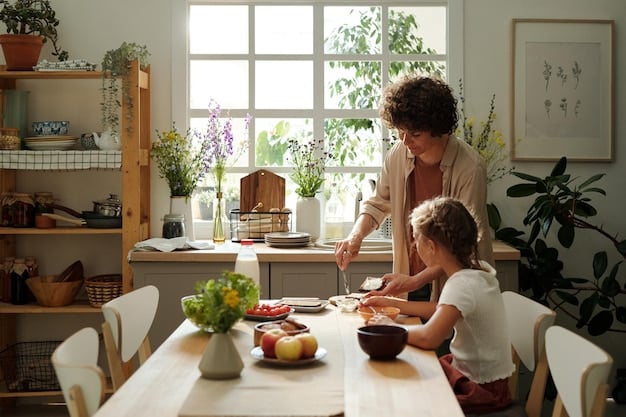Master the Art of Frugal Living: Save Money, Enhance Life

The Art of Frugal Living: Practical Tips to Save Money Without Sacrificing Quality of Life involves making mindful spending choices that enhance your well-being, focusing on value and experiences over excessive material consumption, and fostering financial security without compromising happiness.
Embarking on a journey of the art of frugal living: practical tips to save money without sacrificing quality of life isn’t about deprivation; it’s about making smarter choices and prioritizing what truly matters. It’s about finding joy in experiences, valuing quality over quantity, and building a secure financial future.
Understanding the Essence of Frugal Living
Frugal living goes beyond just clipping coupons and finding the best deals. It’s a philosophy that emphasizes mindful spending and intentional living, focusing on making the most of your resources without feeling deprived.
The core of frugal living lies in consciously evaluating your purchases, prioritizing needs over wants, and seeking value in every transaction. It’s about being resourceful, creative, and environmentally conscious in your daily life.
What Does Frugal Living Really Mean?
Frugal living is often misunderstood as being cheap or stingy. However, it’s about being smart and deliberate with your money, ensuring that your spending aligns with your values and long-term goals. It’s about maximizing happiness and fulfillment without breaking the bank.
Benefits Beyond Just Saving Money
The advantages of embracing a frugal lifestyle extend far beyond just saving money. It can lead to reduced stress, increased financial security, and a greater sense of control over your life. It also encourages creativity, resourcefulness, and a deeper appreciation for the things you already have.

- Less Financial Stress: Knowing you’re in control of your finances provides peace of mind.
- Greater Financial Freedom: Saving money opens doors to opportunities like investing and early retirement.
- Increased Environmental Awareness: Frugal living encourages reducing waste and making sustainable choices.
Ultimately, understanding the true essence of frugal living empowers you to make informed decisions, build a stronger financial foundation, and live a more fulfilling life.
Budgeting Like a Pro: Setting Financial Priorities
Creating a detailed budget is the cornerstone of frugal living. It provides a clear picture of your income and expenses, allowing you to identify areas where you can save money and allocate resources more effectively.
Budgeting isn’t about restriction; it’s about gaining control over your finances and directing your money toward the things that matter most to you.
Tracking Income and Expenses
The first step in effective budgeting is tracking your income and expenses. Use budgeting apps, spreadsheets, or even a simple notebook to record every dollar you earn and spend. This will help you identify your spending patterns and areas where you can cut back.
Creating a Realistic Budget
Once you have a clear understanding of your income and expenses, create a realistic budget that aligns with your financial goals. Prioritize essential expenses like housing, food, and transportation, and then allocate funds for discretionary spending, savings, and debt repayment.
- The 50/30/20 Rule: Allocate 50% of your income to needs, 30% to wants, and 20% to savings and debt repayment.
- Zero-Based Budgeting: Allocate every dollar of your income to a specific purpose, ensuring that your income minus your expenses equals zero.
- Envelope System: Use cash for discretionary spending categories to help you stay within your budget.
By setting financial priorities and creating a budget that reflects your values and goals, you can take control of your financial future and embark on a path toward financial freedom.
Smart Shopping Strategies for Frugal Living
Smart shopping is a crucial component of frugal living. It’s about being a savvy consumer, making informed purchasing decisions, and finding ways to get the best value for your money.
Rather than impulse buying or blindly following trends, smart shopping involves careful planning, research, and a commitment to finding the most cost-effective options available.
Embrace the Power of Planning and Comparison Shopping
Before making any purchase, take the time to plan and research your options. Create a shopping list, compare prices at different stores, and look for sales, discounts, and coupons. Online tools and apps can make comparison shopping easier than ever before.
Buy Used or Refurbished Items
Consider buying used or refurbished items whenever possible. You can often find high-quality products at a fraction of the cost of new items. Online marketplaces, consignment shops, and thrift stores are great resources for finding used goods.
Negotiate Prices and Look for Discounts
Don’t be afraid to negotiate prices, especially when purchasing big-ticket items. Look for discounts, such as student discounts, senior discounts, or military discounts. Sign up for email newsletters to receive exclusive offers and promotions.

By adopting smart shopping strategies, you can significantly reduce your spending and make your money go further. Shopping consciously and intentionally allows you to acquire the things you need without overspending or accumulating unnecessary debt.
Cooking at Home: A Frugal and Healthy Choice
Cooking at home is one of the most effective ways to save money on food. Eating out regularly can be expensive, while cooking at home allows you to control portion sizes, ingredients, and costs.
Beyond the financial benefits, cooking at home can also be a healthier choice. You have complete control over the ingredients you use, allowing you to avoid processed foods, unhealthy fats, and excessive sodium.
Meal Planning and Batch Cooking
Meal planning is essential for efficient and frugal cooking. Plan your meals for the week, create a shopping list, and stick to it. Utilize batch cooking to prepare large quantities of food that can be portioned and frozen for future meals.
Utilizing Leftovers and Reducing Food Waste
Make the most of leftovers by incorporating them into new meals. Get creative with recipes and find ways to repurpose leftover ingredients. Reduce food waste by properly storing food, composting food scraps, and avoiding impulse purchases of perishable items.
Grow Your Own Herbs and Vegetables
Consider growing your own herbs and vegetables, even if you only have a small space. A small herb garden can save you money on fresh herbs, and growing your own vegetables can provide you with healthy and affordable produce.
Embracing home cooking is a win-win situation. It not only saves you money but also promotes a healthier lifestyle and fosters a greater appreciation for food.
DIY and Home Repairs: Save Money and Gain Skills
Learning to do things yourself can save you a significant amount of money on services and repairs. From simple home repairs to crafting your own decorations, DIY projects can be both rewarding and cost-effective.
Taking a DIY approach not only saves you money but also allows you to develop valuable skills and express your creativity.
Basic Home Repairs and Maintenance
Learn basic home repair skills such as fixing leaky faucets, patching drywall, and changing light fixtures. Online tutorials and home improvement books can provide you with the knowledge and skills you need to tackle common household tasks.
Crafting and Repurposing
Get creative and craft your own decorations, gifts, and household items. Repurpose old clothing, furniture, and other items to create something new and unique. This not only saves you money but also reduces waste and promotes sustainability.
- Upcycle Old Clothes: Turn old t-shirts into shopping bags or cleaning rags.
- Refurbish Furniture: Give old furniture a new look with paint, fabric, or new hardware.
- Make Your Own Cleaning Products: Create natural and cost-effective cleaning solutions using ingredients like vinegar, baking soda, and essential oils.
By embracing DIY projects and learning basic home repair skills, you can save money, gain valuable skills, and add a personal touch to your home.
Entertainment on a Budget: Enjoying Life Without Overspending
Entertainment doesn’t have to be expensive. There are many ways to enjoy life and have fun without breaking the bank. Frugal entertainment focuses on experiences that are affordable, enriching, and meaningful.
Rather than relying on costly entertainment options, frugal living encourages finding enjoyment in simple pleasures, community events, and creative pursuits.
Free and Low-Cost Activities
Take advantage of free and low-cost activities in your community, such as parks, museums, libraries, and community events. Explore free hiking trails, attend free concerts or lectures, and visit local farmers’ markets.
Creative and At-Home Entertainment
Get creative and find entertainment options that you can enjoy at home. Host game nights, movie nights, or potluck dinners with friends and family. Read books, play board games, or learn a new hobby.
By embracing frugal entertainment options, you can enjoy life to the fullest without overspending. Focusing on experiences that are enriching, meaningful, and affordable allows you to create lasting memories without emptying your wallet.
| Key Point | Brief Description |
|---|---|
| 💰 Budgeting | Track income/expenses to identify saving opportunities. |
| 🛒 Smart Shopping | Plan, compare prices, and buy used or refurbished items. |
| 🍳 Home Cooking | Meal plan, batch cook, and reduce food waste. |
| 🛠️ DIY & Repairs | Learn basic repairs and craft/repurpose items to save money. |
Frequently Asked Questions
▼
Frugal living is about consciously making smart financial decisions and focusing on value over excessive spending, ensuring financial security without compromising your enjoyment of life.
▼
Begin by tracking your income and expenses for a month. Then, create a budget prioritizing essential expenses and allocating funds for savings and discretionary spending.
▼
Smart shopping involves planning your purchases, comparing prices across retailers, using coupons, and considering buying used or refurbished items to save money.
▼
Cooking at home helps you control portion sizes and ingredients, avoid unhealthy foods, and significantly reduces your food expenses compared to eating out regularly.
▼
Frugal entertainment includes free community events, parks, libraries, hosting game nights at home, and engaging in hobbies that don’t require significant spending.
Conclusion
Mastering the art of frugal living: practical tips to save money without sacrificing quality of life is a transformative journey. By implementing these strategies, you can achieve financial stability, reduce stress, and enjoy a more fulfilling and meaningful life, all while being mindful and intentional about your spending.





